|
|
|
Sort Order |
|
|
|
Items / Page
|
|
|
|
|
|
|
| Srl | Item |
| 1 |
ID:
138301


|
|
|
|
|
| Summary/Abstract |
What determines the location of those human rights international non-governmental organization (INGO) resources found outside of the highly developed Western democracies? We draw a distinction between the bottom-up mobilization processes driving the location of human rights organization (HRO) members from the top-down strategic concerns driving where HRO leaders place permanent offices. In particular, we find that, while political opportunity structures generally increase the likelihood that a state has HRO members, it has a curvilinear influence on the number of HRO secretariats, which typically locate in areas seen as having a higher need for organizational resources. Further, while there is no clear connection between human rights abuses and HRO memberships in a state, HROs' strategic concerns lead them to place offices with reference to both local and neighborhood “need”—in other words, levels of repression.
|
|
|
|
|
|
|
|
|
|
|
|
|
|
|
|
| 2 |
ID:
132489
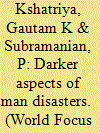

|
|
|
|
|
| Publication |
2014.
|
| Summary/Abstract |
Disaster is a term one would rather be not associated with because of the negative vibes that it sends out. The ways and means to overcome the negative-thoughts that are brought on in the wake of disaster assume a lot of importance. The consequences of disaster have such far reaching and destructive effects that we become helpless individuals running helter skelter to seek protection and also recover from the shock of disaster.
|
|
|
|
|
|
|
|
|
|
|
|
|
|
|
|
| 3 |
ID:
132498
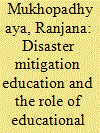

|
|
|
|
|
| Publication |
2014.
|
| Summary/Abstract |
Disasters are increasing exponentially. The number of disaster events which was 73 in 1900-09 has increased to 4494 during 2000-09. More people were affected in the two recent decades than the earlier ones. During the second half of the 20th century, more than 200 major natural disasters occurred in different parts of the world and claimed the lives of around 1.4 million people. In 2011 alone, 302 hazards resulted in disasters that claimed almost 30,000 lives, affected 206 million people and in?icted damages worth an estimated USS 366 billion, according to the United Nations Office for Disaster Risk Reduction.
|
|
|
|
|
|
|
|
|
|
|
|
|
|
|
|
| 4 |
ID:
128856
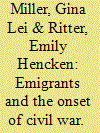

|
|
|
|
|
| Publication |
2014.
|
| Summary/Abstract |
We propose that emigrants affect the likelihood of civil war onset in their state of origin by influencing the willingness of individuals to join rebel movements and the probability that the state and rebels will be unable to reach a mutually acceptable bargain to avoid conflict in three ways. First, migrants communicating with actors at home facilitate valid comparisons between the effects of policies in the home state as compared to policies in the host state enacted on a similar group, creating new motivation to join collective challenges against the state. Second, migrants send remittances, providing resources that can be used in collective challenges that are particularly difficult for states to anticipate, making the outbreak of conflict more likely. Finally, migrants publicize information about conditions in their home state while living in the host state, reducing home government uncertainty such that conflict is less likely to occur. We test these hypotheses on an international dataset and find support for each of our predicted mechanisms.
|
|
|
|
|
|
|
|
|
|
|
|
|
|
|
|
| 5 |
ID:
120867
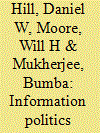

|
|
|
|
|
| Publication |
2013.
|
| Summary/Abstract |
''Information politics'' INGOs such as Amnesty International have incentives to maintain their credibility by carefully vetting information about rights abuses committed by governments. But they are also strategic actors that may inflate allegations of abuse to fulfill organizational imperatives. This raises an intriguing question: When are INGOs more likely to exaggerate their allegations? In answer to this question, we argue that news media reporting pressures INGOs to comment for organizational reasons, even if the information available to them is poor. On the other hand, higher numbers of domestic human rights NGOs increase the quality of available information, and INGOs will find more credible information provided about states as the winning coalition to the selectorate rises. Yet, an incentive to exaggerate allegations under certain conditions does not imply that INGOs will always do so. Indeed, there exists significant observed variation in INGO reports about government abuse. To test our hypotheses, we employ a zero-inflated ordered probit model with correlated errors that permits us to model an unobservable probability (the probability that the INGO exaggerates its allegations) and correct for potential bias. Results provide support for our hypotheses, and suggest that Amnesty International adheres to its credibility criterion, rarely succumbing to incentives to exaggerate abuse.
|
|
|
|
|
|
|
|
|
|
|
|
|
|
|
|
| 6 |
ID:
124220
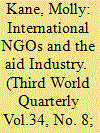

|
|
|
|
|
| Publication |
2013.
|
| Summary/Abstract |
The Make Poverty History campaign, launched in 2005, mobilised citizens to press their governments at key moments throughout the year to take action to eliminate global poverty. Initiated and ?nanced by international development NGOs (INGOs), the campaign appealed to a broad constituency, building unity
around three demands: more and better aid, debt cancellation and trade justice. The call for solidarity and economic justice resonated with millions of people, who added their names to a 'virtual' coalition via internet petitions and public demonstrations around the world.
|
|
|
|
|
|
|
|
|
|
|
|
|
|
|
|
| 7 |
ID:
145700


|
|
|
|
|
| Summary/Abstract |
Networks of international nongovernmental organizations with missions concerning conflict resolution (CROs) conduct a number of innovative international programs designed to promote peace. Is this network of CROs effective? In this article, we argue that the CRO network can transmit information and promote norms of peace that help in reducing international conflict. Our theoretical argument builds on earlier work concerning international governmental organizations (IGOs) and peace and we examine whether and how the connections among states through CRO ties can lead to reductions in international conflict. We test the key empirical implication of our argument – concerning how the CRO network can foster peace – using new social network measures that focus on the actual network of citizens and elites connected internationally by CROs, rather than focusing on the size or presence of civil society within a state. We find considerable support for our central hypothesis that the network of international CROs is associated with peace. When a state is more embedded within the CRO network, international bellicosity from that state is diminished. This result holds at both the monadic and dyadic (non-directed and directed) levels of analysis. At the dyadic level, the CRO network works even when we account for the IGO network with a similar conflict resolution focus. At the dyadic level, we find that the greater the number of possible CRO informational channels between the states in the dyad, the less bellicosity within the dyad.
|
|
|
|
|
|
|
|
|
|
|
|
|
|
|
|
|
|
|
|
|